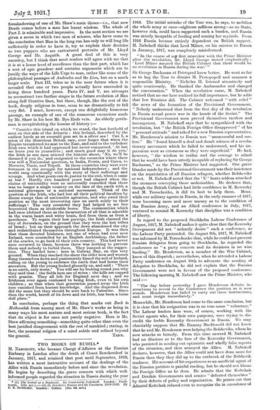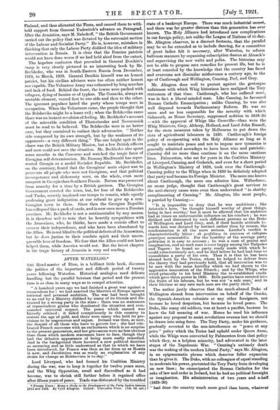TWO BOOKS ON RUSSIA.* NA.1303i0FF, who became Chargé d'Affaires at
the Russian Embassy in London after the death of Count Benckendorf in January, 1917, and retained that post until September, 1919, has written a most instructive account of the dealings of the Allies with Russia immediately before and since the revolution. He begins by describing the grave concern with which well- informed people regarded the situation in Russia during the year
• to The Ordeal of a Diplomat. By Constantin Nabokoff. London : Duck- worth. 1159. net.)—(2) In Denikin's Russia and the Caucasus. 1919-1920. By C. B. Bechhoter., London : Collins. Res. Oti. net-1
1916. The initial mistake of the Tsar was, he says, to mobilize
the whole army at once—eighteen millions strong—as no State, however rich, could have supported such a burden, and Russia was utterly incapable of feeding and arming her myriads. From 1916 Russia became entirely dependent on British support. M. Nabokoff thinks that Lord Milner, on his mission to Russia in January, 1917, was completely misinformed.
"In the course of my first interview with the Prime Minister after the revolution, Mr. Lloyd George stated emphatically : Lord Milner assured the British Cabinet that there would be no revolution in Russia during the war.'" Sir George Buchanan at Petrograd knew better. He went so far as to beg the Tear to dismiss M. Protopopoff and summon a responsible Ministry. "Nicholas II. listened attentively and quite courteously. He thanked the Ambassador and changed
the conversation." When the revolution came, M. Nabokoff noticed that no one here realized its full importance, but he adds that few Russians did. The Cabinet welcomed "with relief " the news of the formation of the Provisional Government. "Nobody understood that from the first day of the revolution in Russia actual power was in the hands of the Soviet." The Provisional Government soon proved themselves tactless and incompetent. M. Nabokoff says that he sympathized with the revolution, but "the British Foreign Office disapproved" of his "personal attitudo " and asked for a new Russian representative. Mr. Ilendersou's mission to Russia was "unsuccessful and use- lees." He "found himself a deaf and dumb witness of a revolu- tionary movement which he failed to understand, and his im- pressions were as erroneous as they were superficial." He had, however, "the wisdom to realize and tile courage to admit that he would have been utterly incapable of replacing Sir George Buchanan," as the Prime Minister had suggested. One grave blunder made by the Provisional Government was their insistence on the repatriation of all Russian refugees, whether Bolsheviks or not. M. Nabokoff noted that the ' U ' boats seldom attacked the steamers conveying these undesirables. Ho declares that, though the British Cabinet had little confidence in M. Kerensky and M. Tereschenko, it did its best to help them. Mean- while our military agents in Russia, in the early summer of 1917, were becoming more and more uneasy as to the condition of the Russian Army, and an Allied conference in July, 1917, ventured to remind M. Kerensky that discipline was a condition of liberty.
In regard to the proposed Stockholm Labour Conference of August, 1917, M. Nabokoff makes it quite clear that the Kerensky Govegunent did not "ardently desire" such a conference, as the Labour Party pretended. On August 9th, 1917, M. Nabokoff was informed by M. Tereschenko that, while he could not prevent Russian delegates from going to Stockholm, he regarded the
conference as "a party concern and its decisions in no wise binding." Mr. Henderson, as a member of the War Cabinet, knew of this dispatch ; nevertheless, when he attended a Labour
Party conference on August 10th to advocate the sending of delegates to Stockholm, he did not explain that the Russian Government were not in favour of the proposed conference. The following morning M. Nabokoff saw the Prime Minister, who said :—
"The day before yesterday I gave Henderson definite in- structions to reveal to the Conference the position as it now stands. Henderson has failed to carry out these instructions, and must resign immediately."
Meanwhile, Mr. Henderson had come to the same conclusion, but it is clear that his resignation was in no true sense "voluntary." The Labour leaders here were, of course, working with the Soviet agents who, for their own purposes, were trying to dis- credit the feeble Kerensky Government in Russia. We may charitably suppose that Mr. Ramsay MacDonald did not know that he and Mr. Henderson were helping tho Bolsheviks, whom ho now attacks so bitterly. From this time onward M. Nabokoff had no illusions as to the fate of the Kerensky Government, who persisted in sending out optimistic and wholly false reports of the situation, and thus annoyed the Allies. M. Nabokoff declares, however, that the Allies could not have done more for Russia than they they did up to the outbreak of the Bolshevik madness. His account of his experiences as an unofficial agent of the Russian patriots is painful reading, but he should not blame the Foreign Office as he does. He admits that the Koltehak and Denikin Governments and armies "defeated themselves" by their defects of policy and organization. He points out that Admiral Koltchak refused even to recognize the in ..enendence of Finland, and thus alienated the 'Finns, and caused them to with- hold support from General Yudeniteh's advance on Petrograd. Mter the Armistice, says M. Nabokoff, "the British Government tarried out the policy that was dictated by the extremist section of the Labour and Socialist Party." He is, however, mistaken in thinking that only the Labour Party disliked the idea of Military intervention in Russia. It is clear that the Russian patriots would not have done worse if we had held aloof from the outset.
The hopeless confusion that prevailed in General Danikin's ramp is very clearly pictured in an interesting book by Mr. Bechhofer, who was in South-Eastern Russia from December, 1919, to March, 1920. General Denikin himself was an honest patriot, but his civilian advisers were too often neither honest nor capable. The Volunteer Army was exhausted by long marches and lack of food. Behind the front, the towns were packed with refugees, dying of famine or of typhus. The Cossacks, always an unstable element, veered first to one side and then to the other. The ignorant populace hated the party whose troops Were in occupation. When the Volunteers came, the people thought that the Bolsheviks might be a lesser evil ; when the Bolsheviks came there was an instant revulsion of feeling. Mr. Bechhofer's account of the miserable condition of Ekaterinodar and Novorossisk must be read to be believed. The Bolsheviks Were in no better case, but they contrived to outlast their adversaries. "Neither side conquered by its own strength, but by the weakness of its opponents—a very different thing." The one bright spot in the chaos was the British Military Mission, but a few British officers and men could not save the situation. Mr. Bechhofer also spent some months in the Caucasus and watched the tragic farce of Georgian self-determination. Mr. Ramsay MacDonald has repre- sented Georgia as a model Socialist Republic. Mr. Bechhofer, on the contrary, found that the "Georgians' main object was to persecute all people who were not Georgians, and that political incompetence and dishonesty were, on the whole, even more rampant in Georgia than Southern Russia. Batum was preserved from anarchy for a time by a British garrison. The Georgian Government coveted the town, but, for fear of the Bolsheviks and Turks, secretly implored our troops to remain, while openly professing great indignation at our refusal to give up a non- Georgian town to them. Since then the Georgian Republic has collapsed like a pack of cards, and is now once more a Russian province. Mr. Bechhofer is not a sentimentalist by any means. it is therefore well to note that he heartily sympathizes with the Armenians, who, he thinks, have made a serimis effort to recover their independence, and who have been abandoned by the Allies. He is not blind to the political defects of the Armenians, but he does justice to their resolute spirit and their uncon- querable love of freedom. We fear that the Allies could not have helped them, while America would not. But the latest chapter in the tragic history of Armenia is very sad reading.











































 Previous page
Previous page